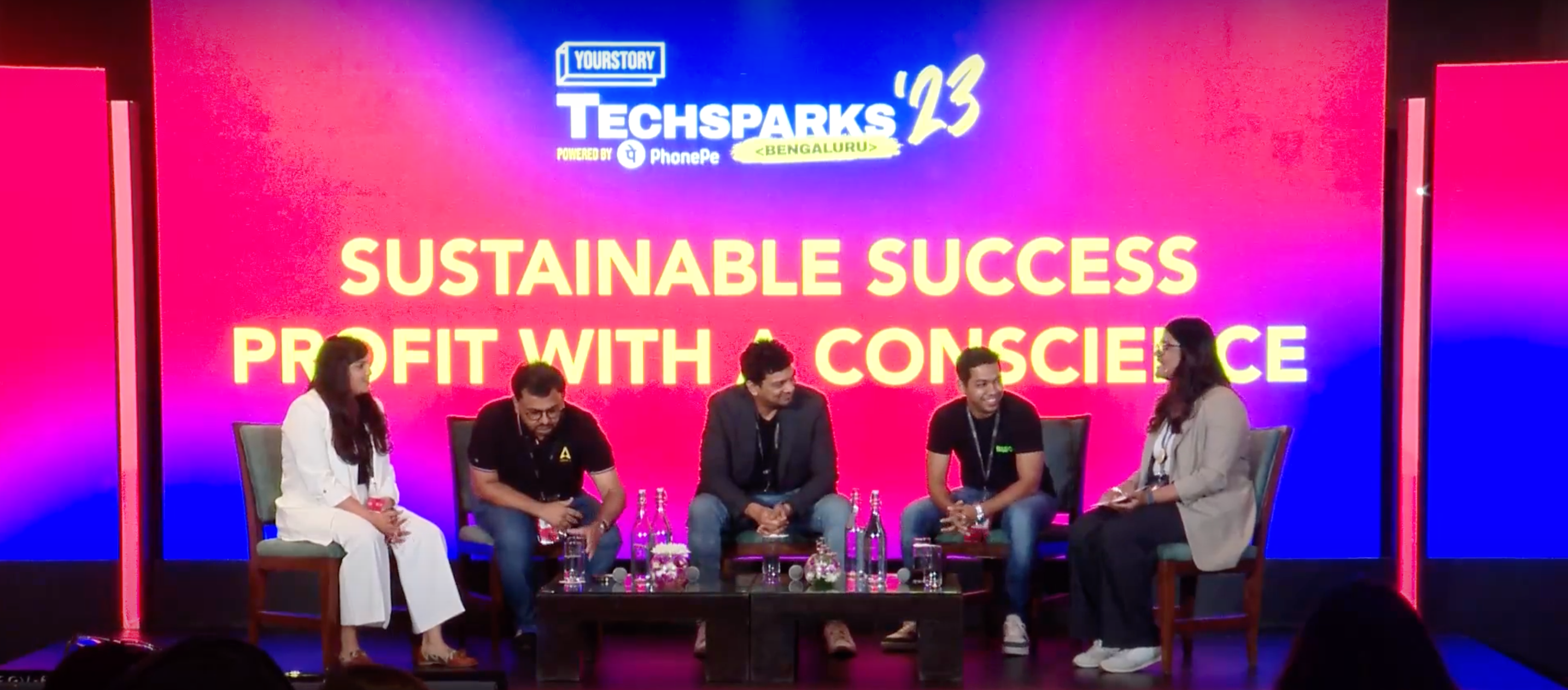
Building a green business has become of vital importance for companies and for planet Earth.
From baby care products and clothing to makeup and furniture, startups are striving to make everything eco-friendly. A study by Bain and Company showed a positive correlation between companies that followed ESG norms and their revenue growth. Those who followed it were able to record better revenue growth than some of their counterparts who didn’t follow.
During a panel discussion at TechSparks 2023, Sahar Mansoor, Founder of Bare Necessities; Cherish Tota, Director of Thefuture.green; Aditya Ruia, Founder of Beco; and Ankit Kedia, Founder and Lead Investor at Capital A, discussed how sustainability translates into profitability.
The panellist highlighted what it will take for startups to achieve profitability and sustainability economically, and the challenges encountered while building a niche space in the country.
Sahar of Bare Necessities pointed out that creating a market for the product was one of the challenges in this space.
“When we first started in 2017, sustainability wasn’t so much of an Instagram phenomenon that you do see today. Creating awareness about our product and about why we’re currently living in the largest waste crisis of our lifetime. There’s never been more waste on this planet than right here right now today,” she added.
.thumbnailWrapper
width:6.62rem !important;
.alsoReadTitleImage
min-width: 81px !important;
min-height: 81px !important;
.alsoReadMainTitleText
font-size: 14px !important;
line-height: 20px !important;
.alsoReadHeadText
font-size: 24px !important;
line-height: 20px !important;

Bengaluru-based Bare Necessities provides zero-waste alternatives to conventional toxin-formulated and plastic-packaged personal, lifestyle, and home care products.
Beco founder Aditya highlighted that almost 60 to 70% of consumers say they will make a more sustainable choice, but less than 25% actually end up buying. “There is a positive spin that there is an audience today which is listening to it,” he said.
“The challenge for most sustainable brands like us today is that people or organisations claim that they want to follow sustainability, but they don’t end up doing anything. Maybe, they end up picking substitutes that look good, but it’s not doing any good to the environment,” he added.
Ankit Kedia, Founder and Lead Investor at Capital A, explained how an investor looks at this space and when they should emphasise founders to focus on profitability.
“The basics of business don’t change. Revenue and profits are an absolute must for any business—for it to be a VC investable or an investable business per se. Am I wrong in asking the founder that your business should make a profit? The answer is no. Do we push founders for profitability? Yes. But it’s a blunder to ask a founder for profitability in the first three years of business,” Ankit said.
Differing with the opinion, Aditya said that it’s a business with a purpose for most sustainability startups. “The normal characterisation of us could be sort of an NGO or someone who wants to be known, not for profit, but I think of it as a business with a purpose.”
He added that there is an understanding among consumers that eco-friendly products are costly. Hence, the price factor comes into play. Thefuture.green’s Cherish Tota explained that they as a brand have been able to mould that perception.
“As long as it doesn’t match the price of existing polluting products, we will never be able to do mass adaptation. So my tissue paper, for example, is the same price as what you would otherwise pay for a non-premium product. We position it in such a way that it is eco-friendly and hygienic. Only that break of mindset is required. After that, it has to be practical sustainability. That’s what we are all about,” Cherish said.
Edited by Suman Singh



![Read more about the article [Funding alert] AI chatbot startup LimeChat raises $750K in seed round led by pi Ventures, Stellaris](https://blog.digitalsevaa.com/wp-content/uploads/2021/04/Imageycna-1617945039242-300x150.jpg)




![Read more about the article [Funding alert] EV charging startup Statiq raises $25.7M led by Shell Ventures](https://blog.digitalsevaa.com/wp-content/uploads/2022/06/EV1564051350075-300x150.png)
![Read more about the article [Weekly funding roundup July 15-21] VC inflow continues to remain downcast](https://blog.digitalsevaa.com/wp-content/uploads/2023/07/funding-lead-image-1669386008401-300x150.jpg)
